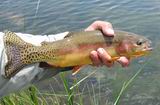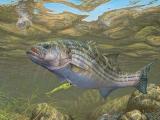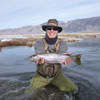REALTIME FLOWS  U. Kern: n/a cfs
U. Kern: n/a cfs
 L. Kern: 1341 cfs
L. Kern: 1341 cfs
 E.W: 312 cfs
E.W: 312 cfs
 U. Owens: 108 cfs
U. Owens: 108 cfs  L. Owens: 496 cfs 09/02/19 1:15 PM PST
L. Owens: 496 cfs 09/02/19 1:15 PM PST
Ya don'thave to feel guilty anymore....
20 posts
• Page 1 of 2 • 1, 2
Ya don'thave to feel guilty anymore....
This just in:
Scientists change minds, decide that fish can't feel pain
4 hrs ago
Everyone can sleep a little easier, Bassmasters: Researchers now say that fish cannot feel pain, even when they've been snagged by a hook. The study authors have surmised that when a fish thrashes after being hooked, it's an unconscious reaction, not a response to pain. Although fish have sensory receptors that, in humans, indicate feeling pain, our finned friends don't have the brainpower to "experience [pain] in any meaningful way." In this study, trout that were hooked and released quickly went back to feeding (or looking for food) which would not have been the expected response if they were in pain. Animal rights groups, however, say this doesn't change their opinion that fish would say "ouch!" if they could.
Scientists change minds, decide that fish can't feel pain
4 hrs ago
Everyone can sleep a little easier, Bassmasters: Researchers now say that fish cannot feel pain, even when they've been snagged by a hook. The study authors have surmised that when a fish thrashes after being hooked, it's an unconscious reaction, not a response to pain. Although fish have sensory receptors that, in humans, indicate feeling pain, our finned friends don't have the brainpower to "experience [pain] in any meaningful way." In this study, trout that were hooked and released quickly went back to feeding (or looking for food) which would not have been the expected response if they were in pain. Animal rights groups, however, say this doesn't change their opinion that fish would say "ouch!" if they could.
"Should you cast your fly into a branch overhead or into a bush behind you, or miss a fish striking, or lose him,or slip into a hole up to your armpits-keep your temper; above all things don't swear, for he that swears will catch no fish."
-

midger - Posts: 3356
- Joined: August 14th, 2008, 9:47 am
- Location: Idaho
Re: Ya don'thave to feel guilty anymore....
Peta won't care, they will just send out more naked women as protestors. Wait - that's a good thing, right?  The only thing I feel guilty about these days when it comes to food is veal - and I still find that I am able to overcome the guilt on the rare occasions when I find it on a restaurant menu.
The only thing I feel guilty about these days when it comes to food is veal - and I still find that I am able to overcome the guilt on the rare occasions when I find it on a restaurant menu.  I am a little worried about your .sig file though. Does this mean that if I stop swearing I will catch more fish? Not that I swear that often, mind you....
I am a little worried about your .sig file though. Does this mean that if I stop swearing I will catch more fish? Not that I swear that often, mind you....
Nature always wins.
> miles = < people
Camp in the mountains, not the left lane!

> miles = < people
Camp in the mountains, not the left lane!

-

Papasequoia - Posts: 4655
- Joined: July 5th, 2008, 10:14 pm
- Location: East Side of the Sierra Nevada
Re: Ya don'thave to feel guilty anymore....
I have seen enough ugly peta supporters like these gals!!!



Mark



Mark
Make Fly Fishing Great Again!
-

fly addict - Posts: 2560
- Joined: August 3rd, 2008, 1:57 pm
- Location: In your honey hole!
Re: Ya don'thave to feel guilty anymore....
Thanks Midger. Now I will sleep better at night. 

Life is good. Eternal life is better!
Richard
Richard
- RichardCullip
- Posts: 4052
- Joined: February 23rd, 2008, 10:55 pm
- Location: Poway, CA
Re: Ya don'thave to feel guilty anymore....
RichardCullip wrote:Thanks Midger. Now I will sleep better at night.
Ya I would of slept better until I saw fly addict's post. Now I don't feel so hot.
-

Pete - Posts: 840
- Joined: May 28th, 2009, 12:30 pm
- Location: Central Coast of Ca.
Re: Ya don'thave to feel guilty anymore....
Google something like 'naked peta' then click on images. That ought to make you feel better. I don't support their cause, but I do support their right to be naked. 
Nature always wins.
> miles = < people
Camp in the mountains, not the left lane!

> miles = < people
Camp in the mountains, not the left lane!

-

Papasequoia - Posts: 4655
- Joined: July 5th, 2008, 10:14 pm
- Location: East Side of the Sierra Nevada
Re: Ya don'thave to feel guilty anymore....
Papasequoia wrote:Google something like 'naked peta' then click on images. That ought to make you feel better. I don't support their cause, but I do support their right to be naked.
Back when I was working a Google search like that would get me fired......
Life is good. Eternal life is better!
Richard
Richard
- RichardCullip
- Posts: 4052
- Joined: February 23rd, 2008, 10:55 pm
- Location: Poway, CA
Re: Ya don'thave to feel guilty anymore....
Mark, that top photo has to be the single most disturbing photo that I have seen in a very long time. Haunting,really. I always figured she had a hairier back than me.
-

duckdog - Posts: 693
- Joined: April 13th, 2009, 8:32 pm
- Location: Oceanside ,Ca
Re: Ya don'thave to feel guilty anymore....
Papasequoia wrote: The only thing I feel guilty about these days when it comes to food is veal - and I still find that I am able to overcome the guilt on the rare occasions when I find it on a restaurant menu.
So Jon,
So how many fine restaurants in Ridgecrest serve veal anyway? I’ve never seen it on the menu at a McDonalds, Jack in the Box, or Burger King! Must be the more upscale restaurants like Denny’s.


Mark
Make Fly Fishing Great Again!
-

fly addict - Posts: 2560
- Joined: August 3rd, 2008, 1:57 pm
- Location: In your honey hole!
Re: Ya don'thave to feel guilty anymore....
Papasequoia wrote:Google something like 'naked peta' then click on images. That ought to make you feel better. I don't support their cause, but I do support their right to be naked.
Papa, sounds like membership is down in your CNFFC.......you must be getting desperate!
As for the painless fish......those scientists are some really intelligent cookies!

I wonder WHO foot the bill for the study? Bass Pro Shops?
"The accomplishment of flyfishing is all about the experience of diversity......and the occasional element of surprise."
(rmg/2012)

(rmg/2012)

-

flybob - Posts: 4275
- Joined: July 27th, 2008, 10:26 am
- Location: S. Orange County
Re: Ya don'thave to feel guilty anymore....
midger wrote:This just in:
Scientists change minds, decide that fish can't feel pain
4 hrs ago
Frickin' scientist just took all the fun outta fishing.
briansII
-

briansII - Posts: 4902
- Joined: September 3rd, 2008, 12:39 pm
- Location: Central Ca.
Re: Ya don'thave to feel guilty anymore....
briansII wrote:midger wrote:This just in:
Scientists change minds, decide that fish can't feel pain
4 hrs ago
Frickin' scientist just took all the fun outta fishing.
briansII
I wonder if they feel pain if they get whacked on a rock, and still live through it...
"Many go fishing all their lives without knowing that it is not fish they are after." ~ Henry David Thoreau
Mark 1:17
Mark 1:17
-

flocktothewall - Posts: 207
- Joined: May 25th, 2012, 6:26 pm
Re: Ya don'thave to feel guilty anymore....
The statement that fish don't feel pain in "any meaningful way" is very loaded, so is the claim that thrashing is an "unconscious reaction" to a lesser extent. In fact, they're so loaded as to defy scientific credence. Thrashing can quite easily be attributed to a fear response, and fear is obviously a conscious reaction in us and many mammals. I don't know how you measure pain in organisms other than humans, and even that's difficult, since pain testimony is relative and pain can often be difficult to isolate, i.e. back pain. I also don't know how you measure consciousness in other organisms, because, well, they don't speak languages we understand. I won't be surprised if science "changes its mind" many more times throughout my life on this issue, especially given the influence of various interest groups. I'd actually like to see the study to see how it was conducted, by whom, and what percentage of the fish resumed feeding shortly after. The fact that the fish go back to feeding and resume normal behaviors is encouraging, but I'm not sure that's definitive. I express skepticism about the study as a vegetarian and as a hopelessly addicted fly fisherman. Even if fish do feel pain, and I'm inclined to think that they do simply given the way evolution has adapted most organisms to feel pain to avoid negative stimuli, it wouldn't prevent me from fishing. That's not to say I feel great about doing it, but fishing is more than just a hobby to me, and I think by and large fishermen with a conscience do more good for fish than harm, as Leopold would remind us with his "split rail values."
-

philosofisher - Posts: 97
- Joined: December 27th, 2012, 8:20 pm
- Location: Culver City, CA
Re: Ya don'thave to feel guilty anymore....
This is what I have read on the subject.
Fish do not have a neocortex in the their brains. This structure is responsible for emotional responses in mammals.
The scientists say without a neocortex fish can not have an emotional response. Fear is a emotional response. Now fish do have a good instinctual responses and that is very different. When they are in danger they flee or hide, and this is a instinctual response. People may think this is an emotional response and manifestation of fear. But that is just personification by the observer and not the true response. With humans when we feel pain we feel the sensation and also fear the continuation of that sensation. So many areas of our brain are active when we experience what we call pain. Fish can not anticipate the continuation of that sensation. Therefore what they feel when they are say caught on a hook or in the talons of an Osprey is a sense of capture from which they try to escape. This has long been the problem with groups like PETA. They wrongly assume that given the circumstance that another; animal, reptile, fish, bird, or whatever the organism they are concentrating on at the time, would naturally react exactly as a human, like themselves, would react in that same situation. (Again lets get back to thinking about fish) And that is just wrong. They are not humans, they are whatever they are and that is something else. They will act differently because of it. They say fear must be learned and here many animals with their limited intellect just are not capable. These groups like PETA maybe well intentioned and very impathetic but it serves them and their goals poorly as it is not based in science.
The other problem with many people who think like PETA is that they are so far removed from the natural world they don't see what is happening in their own backyard. In Nature it is an eat or die world. That means there are many things that die and are eaten every day. Most people have lives that removes them from the process or growing, harvesting, killing, and slaughtering what will become their meals. They don't even consider what happened to get to the point where they can eat their fried chicken or T-Bone steak. They don't even consider they are part of the loop but in reality they have sanctioned these killing to have their meal. Even if you are vegitarians you are killing a living thing to fill your bellies that will turn it's leaves to face the sun. So many of these people are in major denial between what they say and then what they for dinner that is for sure.
Jimbo
Fish do not have a neocortex in the their brains. This structure is responsible for emotional responses in mammals.
The scientists say without a neocortex fish can not have an emotional response. Fear is a emotional response. Now fish do have a good instinctual responses and that is very different. When they are in danger they flee or hide, and this is a instinctual response. People may think this is an emotional response and manifestation of fear. But that is just personification by the observer and not the true response. With humans when we feel pain we feel the sensation and also fear the continuation of that sensation. So many areas of our brain are active when we experience what we call pain. Fish can not anticipate the continuation of that sensation. Therefore what they feel when they are say caught on a hook or in the talons of an Osprey is a sense of capture from which they try to escape. This has long been the problem with groups like PETA. They wrongly assume that given the circumstance that another; animal, reptile, fish, bird, or whatever the organism they are concentrating on at the time, would naturally react exactly as a human, like themselves, would react in that same situation. (Again lets get back to thinking about fish) And that is just wrong. They are not humans, they are whatever they are and that is something else. They will act differently because of it. They say fear must be learned and here many animals with their limited intellect just are not capable. These groups like PETA maybe well intentioned and very impathetic but it serves them and their goals poorly as it is not based in science.
The other problem with many people who think like PETA is that they are so far removed from the natural world they don't see what is happening in their own backyard. In Nature it is an eat or die world. That means there are many things that die and are eaten every day. Most people have lives that removes them from the process or growing, harvesting, killing, and slaughtering what will become their meals. They don't even consider what happened to get to the point where they can eat their fried chicken or T-Bone steak. They don't even consider they are part of the loop but in reality they have sanctioned these killing to have their meal. Even if you are vegitarians you are killing a living thing to fill your bellies that will turn it's leaves to face the sun. So many of these people are in major denial between what they say and then what they for dinner that is for sure.
Jimbo
- Jimbo Roberts
- Posts: 1329
- Joined: October 19th, 2011, 7:47 pm
- Location: San Antonio Texas
Re: Ya don'thave to feel guilty anymore....
Jimbo Roberts wrote:This is what I have read on the subject.
Fish do not have a neocortex in the their brains. This structure is responsible for emotional responses in mammals.
The scientists say without a neocortex fish can not have an emotional response. Fear is a emotional response. Now fish do have a good instinctual responses and that is very different. When they are in danger they flee or hide, and this is a instinctual response. People may think this is an emotional response and manifestation of fear. But that is just personification by the observer and not the true response. With humans when we feel pain we feel the sensation and also fear the continuation of that sensation. So many areas of our brain are active when we experience what we call pain. Fish can not anticipate the continuation of that sensation. Therefore what they feel when they are say caught on a hook or in the talons of an Osprey is a sense of capture from which they try to escape. This has long been the problem with groups like PETA. They wrongly assume that given the circumstance that another; animal, reptile, fish, bird, or whatever the organism they are concentrating on at the time, would naturally react exactly as a human, like themselves, would react in that same situation. (Again lets get back to thinking about fish) And that is just wrong. They are not humans, they are whatever they are and that is something else. They will act differently because of it. They say fear must be learned and here many animals with their limited intellect just are not capable. These groups like PETA maybe well intentioned and very impathetic but it serves them and their goals poorly as it is not based in science.
The other problem with many people who think like PETA is that they are so far removed from the natural world they don't see what is happening in their own backyard. In Nature it is an eat or die world. That means there are many things that die and are eaten every day. Most people have lives that removes them from the process or growing, harvesting, killing, and slaughtering what will become their meals. They don't even consider what happened to get to the point where they can eat their fried chicken or T-Bone steak. They don't even consider they are part of the loop but in reality they have sanctioned these killing to have their meal. Even if you are vegitarians you are killing a living thing to fill your bellies that will turn it's leaves to face the sun. So many of these people are in major denial between what they say and then what they for dinner that is for sure.
Jimbo
Good points and good discussion.
That is interesting about the neocortex and its necessity for emotional responses. If it is the case that scientists have discovered that other organisms that lack a neocortex exhibit the same sort of normal behaviors as a fish after a purportedly painful episode, then that would go some way in establishing its necessity for the feeling of pain. Still, there have been experiments to suggest that a) something is going on in a fish brain during a purportedly painful episode (the neurophysiology supports this in at least some experiments) and b) that fish behaviors change given a purportedly painful episode. Neither of these are sufficient to definitively establish that fish feel pain. And as far as I'm concerned neither of these would be sufficient to establish that they don't (this study seems to mostly take issue with b)). Unfortunately I can't speak to the validity of any of these studies for various reasons, foremost among them being that I'm generally in over my head
I don't think that anyone would deny that fish brains and mammal brains are worlds apart. I also sympathize with the inadequacies about anthropomorphism that you raise, but I'd only caution that it works in both directions. PETA should be more wary of the issue, and would be if appeals to pity weren't so prevalent and effective in arguments for vegetarianism. (For the record I am no sympathizer of PETA). However, I think that given just how disparate our biology is one would do well to err on the side of caution when it comes to claims concerning "what its like" to be another creature, especially those further removed from us. The claim that fish don't feel pain in any meaningful way is also anthropomorphic. It seems to take for granted that pain is a "meaningful," e.g. conscious and significant, mental state that commands our attention. If fish don't feel pain like us but many biological signs are there that they're experiencing something, does that mean it doesn't deserve to be called "pain" or that it isn't significant and "meaningful?" Only if you're using our experience as a standard... Thomas Nagel wrote a famous paper in the 20th Century dealing with phenomenology (i.e. your first person mode of experience) called "What's It Like to be a Bat?" Its content applies here, and the answer is that I have no idea. Bats experience their world in sonar for one thing, how weird is that? If fish don't feel what we experience as pain but still show signs of stress I'm not going to dismiss it as inconsequential by assuming my experience of pain as the standard.
The distinction between instincts and emotions is also very interesting. A lot of the time we use both of them to classify behaviors or feelings that aren't in some sense "rational." And the two can often be hard to parse. It's still acknowledged that humans have instinctual urges for very basic things: sex, food, threats etc... Whether or not these urges remain unconscious they do manifest themselves at the conscious level as desires and fear. I can't even fathom having an instinct without a desire. In fact, I usually end up assimilating the two. Again, it just goes to show you how far removed fish biology and psychology (if there is any) is from our own. So when I read things like fish have "instinctual" reactions but not "conscious" or not "painful" reactions I'm generally incredulous, because I'm not sure how the scientists are using those terms. But that's not to say I think they do have conscious reactions. It only means that I'm on guard because I don't think we have a firm grasp of what we're talking about. Again, that's why I took issue with this report making unscientific sounding claims. Science (generally) should be in the business of making modest claims that are falsifiable, not ones that are loaded and assume a lot of things. But again, since I am largely ignorant of the issue and this study, the claims might not be as bad as I'm making them out to be.
I'll leave it there for now because I need to get back to work. Hopefully we'll get to talk some other time (and preferably some other place) about reasons to be/not to be a vegetarian. I certainly hope I'm not one of the people you describe. I don't have a problem with nature, pain, or even animal death, and I think I have a very sober view of nature. I have a problem with the commoditization of sentient beings, and that is something that has really only been an issue and possible within the last century given advances in science. But I'd prefer not to have that discussion. The one about fish pain is interesting and controversial enough
-

philosofisher - Posts: 97
- Joined: December 27th, 2012, 8:20 pm
- Location: Culver City, CA
20 posts
• Page 1 of 2 • 1, 2
Who is online
Users browsing this forum: No registered users and 110 guests

